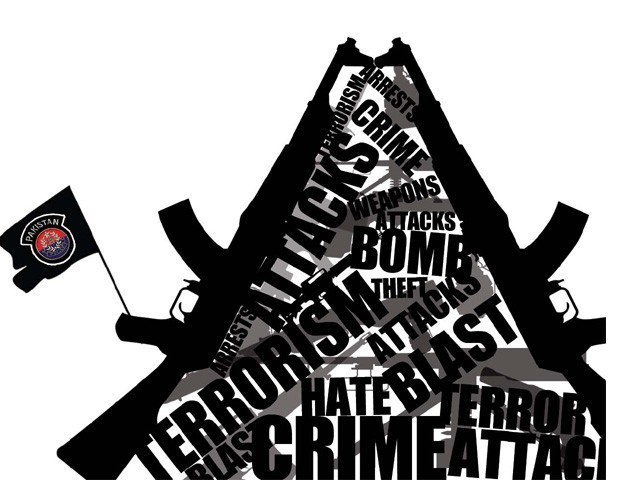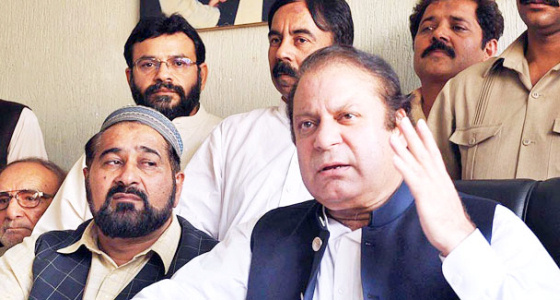Pakistan Punjab |
Terrorism alert: ‘Punjab is home to banned organisations’
By Rana Tanveer
Published: December 30, 2011
Published: December 30, 2011
 In 2010, the province suffered 32 attacks, in which 257 people, including 24 policemen, were killed. DESIGN: NABEEL ABDUSAMAD. |
LAHORE: The city witnessed two explosions in 2011 which left 13 people dead and 112 injured. More than 250 were killed in 18 terrorist activities in 2010.
In the first incident, on January 25, at Ghora Chowk, Urdu Bazar, a suicide bomber killed 10 people and injured 85. The second incident, on February 3, a bombing, killed three people and injured 27 near Haider Sayeen shrine.
Shahbaz Taseer, son of late Punjab governor Salmaan Taseer and US citizen Warren Weinstein were kidnapped for ransom during the year.
Shahbaz was abducted from Gulberg on August 27, while Weinstein was picked up from his Model Town residence.
Security officials have claimed that Al Qaeda operatives are behind both abductions.
The police have still no clue to the whereabouts of Amir Aftab Malik, son-in-law of Gen (retd) Tariq Majeed, who was kidnapped at gunpoint on August 25, 2010.
Some defence analysts hold the view that the operations in Tribal Areas have effected the network of Tehreek-i-Taliban Pakistan (TTP) which had resulted in a lull in incidents of terrorism. They say there is no evidence to conclude that the terrorists have changed their policy permanently.
Prof Hasan Askari Rizvi said overall incidents of terrorism had decreased but noted that some high profile attacks had occurred. He said the reduction was due to the operations being conducted in Tribal Areas. Rizvi added that TTP apparently lacked training facilities as many suicide attackers had been arrested last year. He said recruitment of suicide bombers had likely been denied by the operations in Tribal Areas.
Rizvi said Aiman al Zawahri had claimed to be behind the kidnapping of Weinstein. He said it was evident that Al Qaeda and TTP were involved in these high profile kidnappings.
Rizvi noted that last year several banned organisations, like Sipah-i-Sahaba and Jamatud Dawa, were allowed to continue their activities. He said although these organisations were limited to the Punjab they could surprise and harm to the security establishment, which currently is patronising them.
He said because the Punjab was relatively more conservative and had more of an ‘anti-India’ element than other provinces, these banned organisations had settled here. He said intelligence agencies were using these organisations to put pressure on the US and the Pakistani government against drone attacks and granting Most Favoured Nation (MFN) status to India. He said these organisations were also opposed to the military for its role in the war on terror.
A Counter Terrorism Department police officer, speaking on the condition of anonymity, told The Express Tribune that terrorists had suspended operations in the settled areas. He said it was evident from intelligence reports that many TTP leaders and operatives were alive and in regular contact. He said even Lahore was not free of TTP operatives.
Published in The Express Tribune, December 30th, 2011.
In the first incident, on January 25, at Ghora Chowk, Urdu Bazar, a suicide bomber killed 10 people and injured 85. The second incident, on February 3, a bombing, killed three people and injured 27 near Haider Sayeen shrine.
Shahbaz Taseer, son of late Punjab governor Salmaan Taseer and US citizen Warren Weinstein were kidnapped for ransom during the year.
Shahbaz was abducted from Gulberg on August 27, while Weinstein was picked up from his Model Town residence.
Security officials have claimed that Al Qaeda operatives are behind both abductions.
The police have still no clue to the whereabouts of Amir Aftab Malik, son-in-law of Gen (retd) Tariq Majeed, who was kidnapped at gunpoint on August 25, 2010.
Some defence analysts hold the view that the operations in Tribal Areas have effected the network of Tehreek-i-Taliban Pakistan (TTP) which had resulted in a lull in incidents of terrorism. They say there is no evidence to conclude that the terrorists have changed their policy permanently.
Prof Hasan Askari Rizvi said overall incidents of terrorism had decreased but noted that some high profile attacks had occurred. He said the reduction was due to the operations being conducted in Tribal Areas. Rizvi added that TTP apparently lacked training facilities as many suicide attackers had been arrested last year. He said recruitment of suicide bombers had likely been denied by the operations in Tribal Areas.
Rizvi said Aiman al Zawahri had claimed to be behind the kidnapping of Weinstein. He said it was evident that Al Qaeda and TTP were involved in these high profile kidnappings.
Rizvi noted that last year several banned organisations, like Sipah-i-Sahaba and Jamatud Dawa, were allowed to continue their activities. He said although these organisations were limited to the Punjab they could surprise and harm to the security establishment, which currently is patronising them.
He said because the Punjab was relatively more conservative and had more of an ‘anti-India’ element than other provinces, these banned organisations had settled here. He said intelligence agencies were using these organisations to put pressure on the US and the Pakistani government against drone attacks and granting Most Favoured Nation (MFN) status to India. He said these organisations were also opposed to the military for its role in the war on terror.
A Counter Terrorism Department police officer, speaking on the condition of anonymity, told The Express Tribune that terrorists had suspended operations in the settled areas. He said it was evident from intelligence reports that many TTP leaders and operatives were alive and in regular contact. He said even Lahore was not free of TTP operatives.
Published in The Express Tribune, December 30th, 2011.
Copyrighted © 2011 The Express Tribune News Network
URL: http://tribune.com.pk/?p=313987
URL: http://tribune.com.pk/?p=313987













